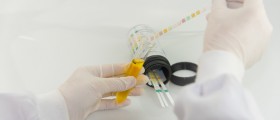
In some cases of urinary tract infection (UTI) a kidney infection may occur. It usually begins in the urethra or bladder and then moves up to the kidneys.
In the instance of a kidney infection, immediate medical attention is needed, and if it is not treated in a timely manner, it can permanently damage the kidneys and even spread into the bloodstream, at which time it becomes a life-threatening infection.
Usually, such infections are treated with antibiotics, and more often than not, hospitalization is required.
Some symptoms and signs of a kidney infection include fever, back and groin pain, pain in the abdomen, frequent urination with burning sensations when urinating, the pus or blood in the urine.
As soon as a person notices these symptoms, they should call a doctor. A doctor should also be called if a person that is treating a UTI is not seeing any signs of improvement.
Such infections occurs when bacteria enters the urinary tract and begin to multiply.
The first resort for treating kidney infections is taking antibiotics. The doctor will depend what antibiotics should be used and for how long depending on the condition and on what kind of bacteria are causing the infection.
If the symptoms do not begin to clear up within a few days, antibiotics might have to be used for a week or even longer. It is also of vital important to take the entire course of antibiotics that the doctor prescribes so that the infection is completely eliminated from the body.
In cases that are more severe, the patient will most likely have to be hospitalized and then be treated with antibiotics intravenously. Naturally, the duration of the hospital stay will depend on the severity of the condition.
If kidney infections become a recurring ailment for someone and turn into a chronic problem, the doctor will probably recommend a kidney specialist to find the central cause of the problem and a solution that will be able to treat it.
Underlying structural abnormalities might cause chronic kidney infections, which might have to be repaired in order to solve the problem.
In order to reduce the discomfort and pain resulting from the infection, it is a good idea to apply a heating pad to the abdomen or back, rather, wherever the person is feeling the most pain.
Nonaspirin pain relievers are that which contain acetaminophen should be used for fevers, but a doctor should be asked about it first in order to approve such a treatment.
It is also important to drink a lot of fluids and remain hydrated at all times. Coffee, alcohol and soda should not be consumed because they can aggravate the condition.

















Your thoughts on this
Loading...